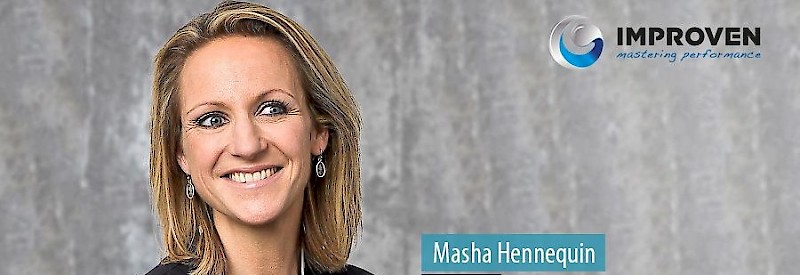The Social and Economic Council (SER) recently advised the government to introduce a mandatory quota for more women at the top of listed companies from 2020. The voluntary target introduced in 2013 does not appear to have been met. Are women getting enough opportunity to advance to the top? And if not, why is that and what is needed to change that?
Journalist Hugo Postma asked Masha Hennequin (42), January last appointed as fifth partner of consultancy firm Improven. "The presence of women on boards or senior management improves the quality of decision-making and therefore the performance of companies. Moreover, we desperately need women as the labour market becomes increasingly tight," Hennequin said.
We are seeing more and more women in top positions. Yet the recent SER opinion indicates that it is not enough. Do you see it the same way?
"If you look at the figures, the Netherlands performs on average compared to other countries," says Hennequin. "Although the number of women on management and supervisory boards has increased from 4% to 15% in recent years, the target quota of 30% has not yet been achieved. I understand the SER's advice, but am not myself in favour of a binding quota. I do not expect it to lead to a real increase in women's participation, especially in middle management where I think women can make the difference. Many thousands of positions are involved."
Does that really exist, this female view of entrepreneurship or is that a preconceived notion from old times?
Hennequin: "Women simply come to decisions differently. They work and think more from the outside in. They first gather information and facts and then link this to their own opinions. With men, it is exactly the other way round. They look for evidence for what fits their ideas. And this can lead to a compartmentalised vision."
"I find it remarkable that research shows that companies with a greater presence of women in key positions actually write better results. The integration of female perspectives into business operations is well and truly important. Even within our own organisation, I get back that, with my joining as the only female partner, the dynamics at the table have changed and there are different talking points and perspectives leading to sometimes a very different approach or outcome."
What needs to be done to improve women's advancement into management and at the top of companies?
"Unfortunately, the traditional gender roles still prevail. Once women become mothers, they usually start working part-time and do not progress to middle management and to the top. Motherhood proves to be a significant hurdle. Not because you are not good enough as a mother, but because there is still a culture that thinks part-time work and leadership do not go together. Fortunately, it is changing. I myself am living proof that this assumption is wrong. I am a mother, have a nice social life, also work hard and happily with a certain flexibility as a partner at Improven. That goes just fine."
"Still, it helps if conditions are created that prevent women from having to take a step back. A good example is parental leave. Women get six weeks' leave. Men's parental leave was recently extended from two days to a week. In mid-2020, that will go to five weeks. THAT will help in a more equal division of tasks around childcare. If both parents become responsible for care tasks and both start working part-time, this will lead to greater labour participation of women."
What is the male-female ratio at Improven?
Hennequin: "At Improven, over a third of colleagues are women. We operate in the fields of finance, risk and IT. That we have a third of women working in these fields in particular is something to be proud of. A few women work on staff and a large number are consultants. They do the same work as the men and they also earn the same. We also have working fathers at Improven, who consciously choose part-time employment."
How did your career develop and what was it like for you to combine motherhood and work?
"I joined Improven's legal predecessor when I already had two small children," Hennequin says. "I was given the space to combine work and private life. Working four days a week and being home on Wednesdays. If one of the children was sick I could help out at home. That flexibility goes both ways, if you ask me. Because if I had to go home in a hurry, I'd happily shift behind the laptop in the evening or at the weekend. What has also helped me is that my partner and I have divided the caring tasks equally. I think it is very important for women who aspire to a professional career to arrange that side of their lives well and agree on it with their partner at an early stage.
The presence of women on boards improves the quality of decision-making and therefore performance. Moreover, we desperately need women as the labour market tightens.
Does part-time work clash with clients' wishes?
Hennequin: "It is important to be transparent about this. We explain to our clients that our consultants, staff and partners also have other responsibilities. This applies to caring for children but also to fulfilling a professorship, for example, so there are times when they are not available."
You became a partner at Improven in January 2019, was that always your ambition?
Hennequin: "I never aspired to that. I was active in commercial management positions At the start of Improven in 2016, I became Director Sales & Marketing and helped build the new brand. That I joined as the fifth partner at the beginning of this year is a heart issue. I love this team and want to help build Improven further. Colleague Guido Anninga and I started 'Young Improven' two years ago, the breeding ground for young and inspired talents. This team now has 20 consultants aged about 22 to 26, half women and half men. That gives this company a good mix of younger and older colleagues, with very diverse backgrounds and ambitions."
What would you like to give young women who are at the beginning of a professional career?
Hennequin: "Women, feel equal! That's how I stand in life myself. Prove through hard work that you are worthy of trust. Make conscious choices and enforce that people also see you as equal. Especially also at work, in how you perform and in negotiations on pay and working conditions. Research shows that women still earn 15% less in equal work. Don't settle for that. Be combative in a relaxed way. If you take everything for granted then you won't get there. You also have to dare to question things."






















